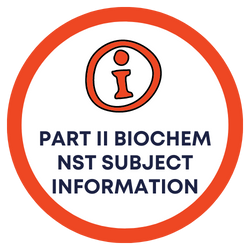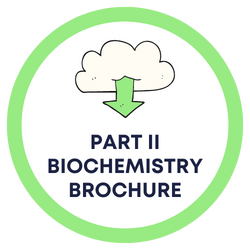General Structure of the Part II Biochemistry CourseBiochemistry is the study of living organisms at the molecular and cellular level. As a core course for the whole of biological sciences, a training in Biochemistry leaves you with the widest choice when you come to select an area of cell/molecular biology in any subsequent research programme or career. Recruiters in industry, government, investment management, regulatory authorities, and industrial law appreciate the breadth and diversity of biological knowledge that Biochemistry provides. Students undertaking Part II Biochemistry will graduate with a B.A. However, students may wish to continue to Part III Biochemistry (fourth year), which leads to a M. Sci. In this instance, students will graduate with both B.A. and M.Sci. degrees.
There are three main strands to the teaching in Part II Biochemistry:
Students may also attend specialist supervisions, with lecturers, following particular lecture blocks. |
Core Lecture TopicsThe course aims to provide students with an advanced integrated knowledge and understanding of core topics, with general principles set in particular contexts:
Specialised Topics
|
The Part II Biochemistry Moodle SiteThe Part II Biochemistry Moodle site contains key teaching materials, such as lecture handouts, links to lecture recordings, and practical notes. The course handbook can also be downloaded from the Moodle site. The Part II Biochemistry course is supported by a comprehensive Moodle site that contains a range of materials that aim to support a variety of learning styles. Other key materials, such as safety information, past exam papers, and more, are also available on Moodle. Students enrolled on the Part II Biochemistry course at the start of Michaelmas Term are automatically subscribed to the Part II Biochemistry Moodle site. If there are any issues reaching the Part II Biochemistry Moodle site, the Teaching Administrator will be able to help. |
Entry Criteria for Part II BiochemistryThe subject Part IB Biochemistry and Molecular Biology is the normal precursor to the Part II course but alternatively, Part IB Cell and Developmental Biology is an adequate background to Part II Biochemistry. MedST and VetST students who are considering a career in medical research after qualifying will find the Part II course an excellent foundation. For more information about admission to Part II Biochemistry, click HERE. All queries about the Part II Biochemistry course should be directed to the Undergraduate Teaching Office. |




